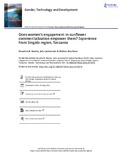| dc.contributor.author | Mosha, Devotha | |
| dc.contributor.author | Jeckoniah, John | |
| dc.contributor.author | Boniface, Gideon | |
| dc.date.accessioned | 2022-05-30T10:42:37Z | |
| dc.date.available | 2022-05-30T10:42:37Z | |
| dc.date.issued | 2022-05-26 | |
| dc.identifier.citation | Mosha, D.B.; Jeckoniah, J. and Boniface, G. (2022) 'Does Women’s Engagement in Sunflower Commercialization Empower Them? Experience From Singida region, Tanzania,' Gender, Technology and Development, DOI: 10.1080/09718524.2022.2073014 | en |
| dc.identifier.uri | https://opendocs.ids.ac.uk/opendocs/handle/20.500.12413/17439 | |
| dc.description.abstract | Empowering women within sunflower value chains can create significant development opportunities for them and generate benefits for their families. This paper asks whether women’s engagement in sunflower commercialization influences their levels of empowerment. The paper uses data from a 2018 study conducted by Agricultural Policy Research in Africa. A cross-sectional research design was used, and data were collected using mixed methods involving primary, qualitative, and quantitative methods as well as secondary data from the literature. A total of 600 farm household heads and 205 focus group participants (7–15) from 15 villages were selected for the study. Qualitative and quantitative data were subjected to content and econometric analysis respectively, with the help of Microsoft Excel and Statistical Package for the Social Sciences programs. The findings revealed that female household heads tend to benefit less than men from sunflower commercialization. Sunflower commercialization had a positive but insignificant influence on women’s empowerment: the study found that low levels of access to and control over productive resources resulted in low agricultural productivity, which affects empowerment levels. However, household commercialization involving all crops did have a positive and significant impact on the empowerment of women because non-cash crops were more likely to be retained by women, even when commercialized. This calls for policies that support and promote a diversified portfolio of livelihood options for women farmers in Singida region. | en |
| dc.language.iso | en | en |
| dc.publisher | Taylor & Francis Group | en |
| dc.rights.uri | http://creativecommons.org/licenses/by-nc-nd/4.0/ | en |
| dc.subject | Agriculture | en |
| dc.subject | Gender | en |
| dc.subject | Rights | en |
| dc.subject | Rural Development | en |
| dc.title | Does Women’s Engagement in Sunflower Commercialization Empower Them? Experience From Singida region, Tanzania | en |
| dc.type | Article | en |
| dc.rights.holder | © 2022 The Author(s). Published by Informa UK Limited, trading as Taylor & Francis Group. | en |
| dc.identifier.externaluri | https://www.tandfonline.com/doi/full/10.1080/09718524.2022.2073014 | en |
| dc.identifier.team | Rural Futures | en |
| dc.identifier.doi | 10.1080/09718524.2022.2073014 | |
| dcterms.dateAccepted | 2022-04-03 | |
| rioxxterms.funder | Department for International Development, UK Government | en |
| rioxxterms.identifier.project | APRA | en |
| rioxxterms.version | VoR | en |
| rioxxterms.versionofrecord | 10.1080/09718524.2022.2073014 | en |
| rioxxterms.funder.project | e1f6d3be-457a-4f13-8b1f-6748d1402d83 | en |


